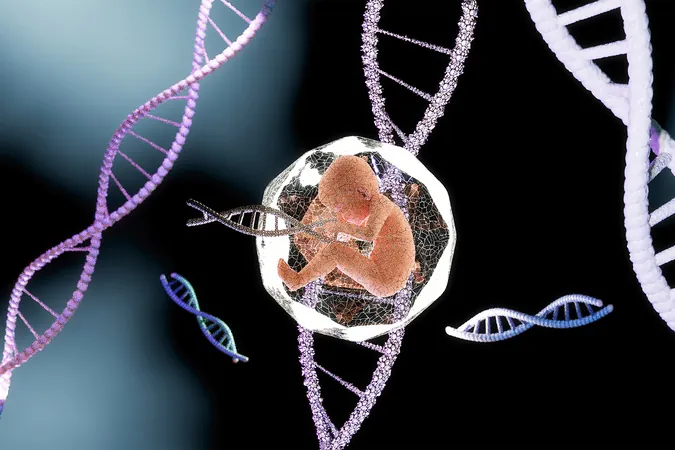
Unlocking the Future of Prenatal Care: Nearly 300 Genetic Disorders Treatable Before Birth!
2025-04-09
Author: Rajesh
A Revolutionary Approach to Fetal Health
Imagine a world where nearly 300 genetic disorders can be treated before a newborn takes its first breath. A groundbreaking study reveals that a wide array of genetic conditions could be detected and managed during pregnancy, creating what researchers are calling a "treatable fetal findings list." This pivotal research, conducted by top scientists from Harvard Medical School, Mass General Brigham, and Duke University, is set to redefine prenatal care.
Bridging the Gap in Prenatal Diagnostics
Researchers identified a critical gap in existing prenatal care and seized the opportunity to define genetic disorders that can be treated during pregnancy. Senior author Nina Gold, a leading geneticist at Massachusetts General Hospital, states, "These conditions are actionable — with the right information, we can intervene early and dramatically improve outcomes for the child and family."
Harnessing the Power of Genomic Sequencing
Thanks to advances in genomic sequencing, prenatal diagnoses have taken a giant leap forward. These tests, when paired with family history, help identify problematic genes linked to ultrasound abnormalities. They can even reveal incidental findings indicating serious, yet treatable health issues—think manageable heart conditions or gastrointestinal disorders treatable with simple therapies. The team aimed to catalog these treatable conditions, giving expectant parents critical insights into their baby's health.
The List: 296 Disorders to Watch For
Through a meticulous review of scientific literature, researchers compiled a staggering list of 296 genetic conditions, from those with emerging fetal treatments to others that require immediate postnatal intervention to avert irreversible damage. The key takeaway is that recognizing these disorders early could significantly decrease both morbidity and mortality among newborns, opening the door for unprecedented early intervention opportunities.
Empowering Families Through Informed Choices
Jennifer Cohen, the lead author and a medical geneticist at Duke University, emphasizes the goal of expanding family options. "Our lists of genes are designed to pave the way for early interventions that could fundamentally alter the course of these diseases," she explains. This unprecedented access to genetic information is poised to change how families approach prenatal care.
Navigating the Complexities and Ethical Considerations
However, this initiative doesn't come without its challenges. Ethical dilemmas abound, as patients might feel overwhelmed with the wealth of information provided. The researchers stress the necessity of collaboration among medical geneticists, obstetricians, and ethicists to effectively manage these intricacies.
A Team Approach to Empower Patients
Gold concludes, "Our mission in compiling this targeted list is to enhance patient care while being mindful of the challenges faced by healthcare providers and families in digesting new health information. It's essential to operate as a cohesive care team to empower our patients and offer them the clearest, most actionable insights possible."
Supported by Leading Institutions
This transformative research was made possible with support from the National Institutes of Health, paving the way for a future where prenatal care offers families not just hope, but tangible solutions.




 Brasil (PT)
Brasil (PT)
 Canada (EN)
Canada (EN)
 Chile (ES)
Chile (ES)
 Česko (CS)
Česko (CS)
 대한민국 (KO)
대한민국 (KO)
 España (ES)
España (ES)
 France (FR)
France (FR)
 Hong Kong (EN)
Hong Kong (EN)
 Italia (IT)
Italia (IT)
 日本 (JA)
日本 (JA)
 Magyarország (HU)
Magyarország (HU)
 Norge (NO)
Norge (NO)
 Polska (PL)
Polska (PL)
 Schweiz (DE)
Schweiz (DE)
 Singapore (EN)
Singapore (EN)
 Sverige (SV)
Sverige (SV)
 Suomi (FI)
Suomi (FI)
 Türkiye (TR)
Türkiye (TR)
 الإمارات العربية المتحدة (AR)
الإمارات العربية المتحدة (AR)